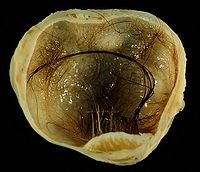
Photo from wikipedia
References 1. Ratan SK, Anand T, Ratan J. Formulation of research question – Stepwise approach. J Indian Assoc Pediatr Surg 2019;24:15‐20. 2. Wiwanitkit V. Plagiarism, beyond CrossCheck, figure and conceptual… Click to show full abstract
References 1. Ratan SK, Anand T, Ratan J. Formulation of research question – Stepwise approach. J Indian Assoc Pediatr Surg 2019;24:15‐20. 2. Wiwanitkit V. Plagiarism, beyond CrossCheck, figure and conceptual theft. Sci Eng Ethics 2014;20:613‐4. Sir, We read the publication on “Formulation of research question (RQ) – Stepwise approach” with a great interest.[1] Ratan et al. described for the process and noted that “To develop a RQ, one needs to begin by identifying the subject of interest and then do preliminary research on that subject. The researcher then defines what still needs to be known in that particular subject and assesses the implied questions.[1]” We would like to share ideas on this aspect. First, starting from the area of interest might be a good idea. Nevertheless, based on the concept of science, the good RQ should start from the observation. In daily clinical practice, we can observe many things, and we might identify a good interesting RQ. If we focus only our interested area, we might overlook the other important useful areas. Another important point is on the statement that “A good RQ needs thorough literature search.[1]” This should be further clarified. If there are many published articles, it means the work lack for novelty and there might be a tendency of conceptual plagiarism.[2] Searching literature should be done to rule out the already studied aspects but not to include the area for repeated study.
Journal Title: Journal of Indian Association of Pediatric Surgeons
Year Published: 2020
Link to full text (if available)
Share on Social Media: Sign Up to like & get
recommendations!